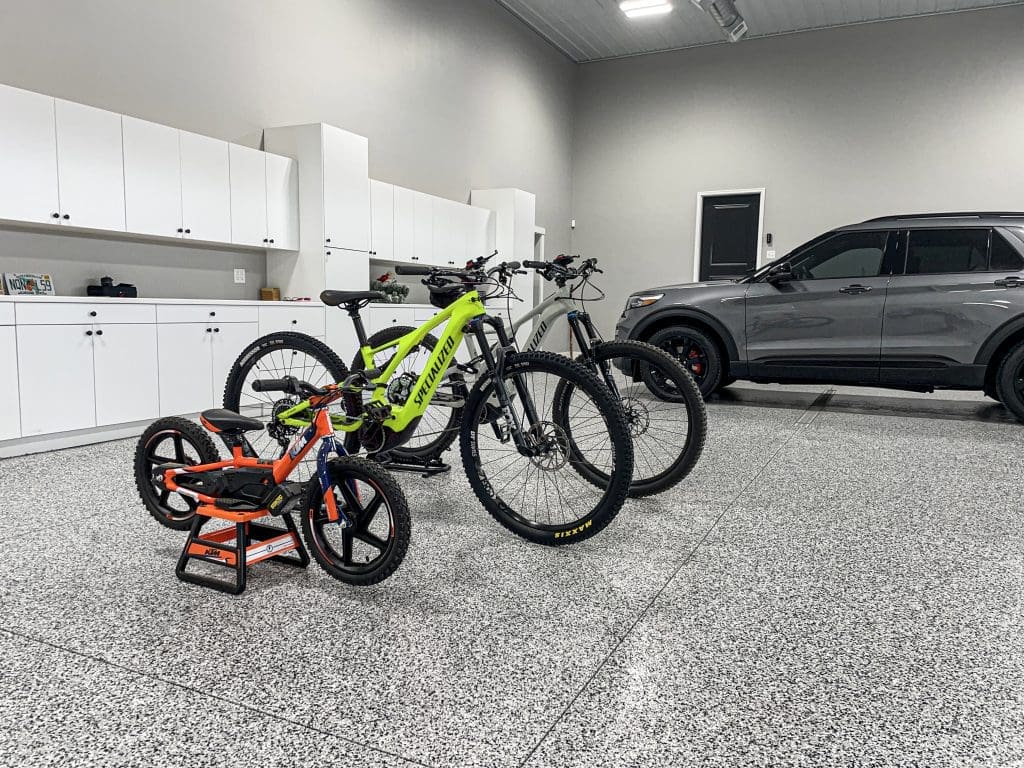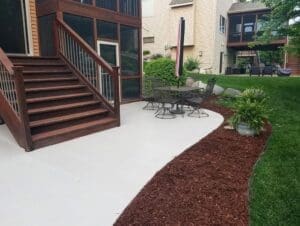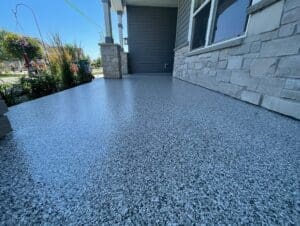What’s Polyurea Flooring?
Polyurea flooring is a super tough coating that’s great for all sorts of spaces, especially garages. It’s made by mixing polyols and isocyanates. People love it because it sets quickly and can handle all sorts of wear and tear. This type of flooring not only looks good but also lasts a long time.
Why Choose Polyurea for Your Garage Floor?
When you’re thinking about garage floors, polyurea has tons of perks that make it a popular pick. Check out these awesome benefits:
- Fast Curing Time: The best part about polyurea is how fast it sets up. You can go back to your normal routine in just a few hours, unlike other types that could leave you waiting for days.
- Tough as Nails: Polyurea is tough against drops, scrapes, and scratches. You can park heavy stuff and work on projects without worrying about wrecking the floor.
- Chemical Resistant: Got spills of oils or other chemicals in your garage? No problem! Polyurea can handle them without staining or getting damaged.
- UV Protection: This flooring won’t fade or yellow when it’s in the sun. It stays looking fresh for years, no matter how bright it gets.
- Aesthetic Options: You can choose from a ton of colors and finishes that fit your style. Whether you’re going for a shiny look or a more matte finish, polyurea lets you customize it.
- Moisture-Resistant: Polyurea keeps water out, preventing mold and mildew. So it’s a healthier choice if your garage is closed up.
In short, polyurea flooring gives your garage a durable surface while also looking sharp.
Frequently Asked Questions
When folks think about getting polyurea in their garages, they usually have a lot of questions. Here are some common ones:
How Long Does Polyurea Flooring Last?
These floors are built to last. With good care, polyurea flooring can stick around for 10 to 20 years or even more. Just remember, how long it lasts can depend on installation quality and how well you keep it up.
How Does Polyurea Stack Up Against Epoxy?
Polyurea flooring beats epoxy in a few key areas:
- Quick Curing: Polyurea hardens fast, usually in just a few hours. On the other hand, epoxy can take a few days before you can do anything on it.
- Flexibility: Polyurea remains flexible, which means it won’t crack as easily under pressure. In contrast, epoxy can become brittle.
- Better UV Resistance: Polyurea stands up much better against sunlight, avoiding fading over time.
These points make polyurea a far more reliable choice for garages.
Is Polyurea Flooring Waterproof?
Definitely! Polyurea floors are designed to be completely waterproof. Their seamless setup keeps moisture from getting in, which is super helpful if you live in a humid or rainy area.
How Long Does Installation Take?
Installing polyurea flooring is a quick process. Usually, it wraps up in 1 to 2 days, depending on your garage size and how complex the job is. You can even start walking on the floor within a few hours after it’s done.
Installation Process
If you decide to go for polyurea flooring, knowing the installation steps can help make everything go better. Getting ready ahead of time, understanding costs, and choosing whether to DIY or hire out are all important pieces of the puzzle.
What Should I Do Before Installation?
Before you jump into getting your polyurea flooring installed, here are some key steps you’ll want to take:
- Clear Out the Space: Make sure the garage is empty. Take out cars, bins, and tools. This makes it easier to install.
- Clean the Concrete: Get rid of dirt, oil stains, and debris. Pressure washing works well, but don’t forget to let the surface dry before starting.
- Fix Any Cracks: Look for cracks in the concrete and fill them in. This keeps the floor super smooth.
- Let Materials Warm Up: Ensure the polyurea is at room temperature before you apply it. This helps it stick better.
These steps really help in making sure your new floor ends up looking great.
What Affects the Cost of Installation?
Here are some things that can change how much installing polyurea flooring will set you back:
- Garage Size: Bigger garages need more materials and labor, adding to the total cost.
- Prep Work: If the concrete needs a lot of repairs or heavy cleaning, that could add to your bill.
- Finish Type: Want a unique finish or color? That can increase the cost of materials.
- DIY vs. Hiring Pros: Whether you’re doing it yourself or hiring someone will lead to different costs.
Should I Hire a Pro or Go DIY for Installation?
While you might think about doing it yourself, remember that installing polyurea can be a bit tricky.
- Pros for DIY: You can save money on labor and if you’re handy, it might turn out great.
- Hiring Professionals: If you want a smooth finish without headaches, going with the pros is smart. They’ve got the skills to get it right quickly.
Ultimately, consider your skill level and what you feel comfortable with to help decide.
Keeping Your Floor in Great Shape
To keep your polyurea floor looking good and lasting long, maintenance is key. The good news is it’s pretty easy. Here are some tips to keep it fresh:
How Should I Maintain My Polyurea Garage Floor?
Just a bit of care will keep your polyurea looking awesome:
- Regular Sweeping: Sweep often to remove dirt and gravel that may scratch your floor.
- Mopping Up: Clean the floor with warm water and a gentle cleaner to keep it looking nice.
- Deal with Spills Right Away: Clean up spills quickly to avoid stains. Since polyurea resists stains, a good wipe will usually do the trick.
- Watch the Temperature: Try not to expose the floor to extreme heat or cold for long periods.
Just these little routines can help keep your floor strong and good-looking.
What Cleaning Products Can I Use?
Stick to gentle cleaners that won’t damage the finish of your floor. Here are some good choices:
- Mild Detergents: A simple dish soap mixed with water works really well.
- pH-Neutral Cleaners: Look for cleaners that say they’re safe for coated floors.
- Avoid Harsh Chemicals: Stay away from ammonia and acidic cleaners as they can harm your floor over time.
Can I Fix Minor Damage Myself?
Yes, you can! If you’ve got small scratches or scuffs, fixing them is usually pretty simple:
- Scratch Repair Kits: Many brands offer kits that give you everything you need to fix small problems.
- Sealant Application: For deeper scratches, you can use a clear sealant to touch up the surface.
- Talk to Your Installer: If you feel stuck, don’t hesitate to reach out to the person who installed your floor for advice.
With regular upkeep, your polyurea garage floor can stay functional and beautiful for years.
Durability and Performance
Polyurea garage floors really shine when it comes to durability and how they hold up against tough conditions. If you’re looking at flooring choices, knowing how well polyurea performs day-to-day is super important.
How Tough Are Polyurea Floors Against Chemicals?
These floors are known for being really strong when it comes to handling chemicals. Whether it’s oil drips from your car or spills from your cleaning supplies, polyurea doesn’t budge.
- Oil and Fuel Resistance: Polyurea won’t soak up oils or fuels, preventing stains from developing.
- Chemical Protection: Common garage chemicals don’t faze polyurea, making it easy to clean up messes.
- Non-Porous Surface: Its seamless design stops chemicals from penetrating, boosting its longevity.
A homeowner shared how easy it is to wipe spills from their polyurea floor without any worries about damage.
Do Polyurea Floors Handle Extreme Temperatures?
Another big plus for polyurea is that it can handle extreme temperatures, so it’s perfect no matter where you live.
- Heat Resistance: Polyurea stands strong in high heat, which is handy for hot tires or heated tools in the garage.
- Cold Resistance: It also remains stable in cold weather without cracking or getting brittle, making it a great choice for colder climates.
One family talked about how their polyurea floor withstood rough winter conditions, proving its durability again. Overall, polyurea floors combine chemical resistance and temperature resilience, making garages usable spaces that endure daily life challenges.
What Homeowners Are Saying
As more people try polyurea in their garages, personal stories and reviews are shedding light on how well it really works. Many people have shared their experiences, capturing both the good and the occasional challenges.
What Do Homeowners Think?
People who have installed polyurea flooring generally have fantastic things to say. Here are some common praises:
- Looks Great and Versatile: Users love the modern and sleek look of polyurea. One homeowner said the glossy finish transformed their garage into a space they’re proud to show off.
- Low Maintenance: Cleaning it easy. A user shared that spills are easy to wipe up, and they’re not worried about oil stains.
- Sturdy and Resilient: Lots of reviews highlight how well the floor holds up. One family said even after months of heavy use, their floor still looked amazing.
Positive reviews really back up that polyurea is a solid choice for garages.
Any Common Issues?
While most feedback is great, some people have reported occasional hiccups:
- Installation Issues: A few users mentioned that getting a perfect installation can take skill. Those who went DIY sometimes had sections that didn’t set perfectly.
- Initial Odor: Some noticed a chemical smell right after installation, but it usually faded quickly.
- Cost Concerns: A couple of homeowners felt that while polyurea offers great value, the upfront cost can be a bit higher than other options.
So even though there are some common concerns, it’s clear that polyurea flooring is a popular pick among homeowners aiming to improve their garage spaces.
Wrapping It Up
In wrapping up our look into polyurea flooring for garages, here are some key takeaways that can really help homeowners make informed choices.
Quick Summary of Key Points
- What it is and Its Benefits: Polyurea flooring is a tough coating that sets quickly, lasts long, and can handle chemicals and extreme conditions. It also comes in many finishes that people love.
- What to Know About Installation: Prep is key, so understanding what it takes, costs involved, and deciding on DIY versus hiring pros is important.
- Caring for Your Floor: Regular maintenance and using safe cleaners helps keep your floor looking new. Plus, the small repairs are doable by many homeowners.
- How Durable it Is: Polyurea outperforms other choices in terms of durability, making it perfect for all sorts of wear and tear.
The good reviews from homeowners give you a solid idea of the benefits while also helping to spot any potential challenges.
Final Tips for Homeowners
For those thinking about polyurea flooring, here are some handy tips to keep in mind:
- Do Your Homework: Take some time to read reviews and chat with pros to get a grip on the best practices for installation.
- Consider Your Installation Options: Figure out if you want to DIY or hire out based on what you’re comfortable with.
- Plan for Maintenance: Learn about maintenance best practices and which cleaners are gentle enough to keep your floor intact.
- Budget Wisely: Keep in mind all the costs involved, from prep to install to possible repairs down the line.
By following these simple tips, homeowners can make smart choices about polyurea flooring that leads to a durable, stylish garage that meets their needs for years to come.



